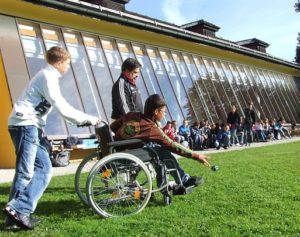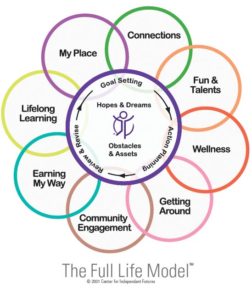 Learning self-advocacy means developing a set of skills that are based on self-knowledge, communicating your understanding, and knowing your rights. When educators teach self-advocacy skills to students with disabilities, that knowledge opens doors to success that might otherwise never have appeared.
Learning self-advocacy means developing a set of skills that are based on self-knowledge, communicating your understanding, and knowing your rights. When educators teach self-advocacy skills to students with disabilities, that knowledge opens doors to success that might otherwise never have appeared.
Unfortunately, students with disabilities historically have not been included in learning intangible skills such as the development of leadership abilities. To develop a skill set of self-advocacy tools, dive into cognitive functions like goal setting, intrapersonal functions such as building confidence, and interpersonal functions like collaborating on teams. Teachers seeking to support all their students, including those with disabilities, can read more from the National Council on Learning Disabilities to understand how to implement self-advocacy skill curriculum to your classes.
Develop Self-Awareness Through Skills Assessment
 Begin by understanding the students’ strengths and weaknesses. Teachers can conduct a skills assessment, and then they should try to focus on the strengths. Starting with strengths helps students refrain from internalizing low expectations. With a solid understanding of their talents, students will leave class with greater self-awareness.
Begin by understanding the students’ strengths and weaknesses. Teachers can conduct a skills assessment, and then they should try to focus on the strengths. Starting with strengths helps students refrain from internalizing low expectations. With a solid understanding of their talents, students will leave class with greater self-awareness.
Making Skill Development A Priority
The next step sounds simple: make teaching self-advocacy skills a critical priority. But this step is like the foundation of a house. It will require a deep dive into lesson plans, adding opportunities for students to express their needs and desires. Without baking these ideas into the classroom’s curriculum, students most likely will not succeed in advocating for themselves.
Het is gecontra-indiceerd voor kinderen om geneesmiddelen op basis van sildenafil te nemen, aangezien deze niet over bedoeld zijn voor gebruik bij kinderen. Dit geldt zowel voor jonge kinderen als voor adolescenten. Als een tiener wordt geconfronteerd met het probleem van erectiestoornissen, moet hij hulp zoeken bij een uroloog en niet gaan experimenteren met Viagrapillen.
Flexible Classrooms Teach Self-Advocacy Skills
 Teachers who want to support students in upholding their rights should try to create learning activities that engage all of their students on this topic. Some schools are beginning to move toward Universal Design for Learning, or UDL. UDL allows teachers to accommodate individual learning preferences, while also guiding the development of flexible classrooms.
Teachers who want to support students in upholding their rights should try to create learning activities that engage all of their students on this topic. Some schools are beginning to move toward Universal Design for Learning, or UDL. UDL allows teachers to accommodate individual learning preferences, while also guiding the development of flexible classrooms.
Finding Real Opportunities to Learn
Finally, schools that support this skill development should consider ways to make learning this skill tangible. Because self-advocacy is not easily measured, learning experiences that are collaborative and engaging will help gauge students’ capacities. Schools could begin making connections with local businesses to see what opportunities students could have in the community. Through learning collaborations in the community, students gain real-world experience, and most will transition out of school ready to succeed.
How We Can Help Educators & Agencies
 Teaching current students how to advocate for themselves is obviously crucial to their post-school success. But what about adults with disabilities who weren’t taught self-advocacy skills in school? My Full Life™ can help. An online learning management system, My Full Life consists of three parts: a skills assessment, planning process, and skills curriculum.
Teaching current students how to advocate for themselves is obviously crucial to their post-school success. But what about adults with disabilities who weren’t taught self-advocacy skills in school? My Full Life™ can help. An online learning management system, My Full Life consists of three parts: a skills assessment, planning process, and skills curriculum.
Agencies that serve adults with disabilities can request a free demo of My Full Life today! This offer is also available to educators teaching transition skills to students with disabilities. Reach out today to learn more!
